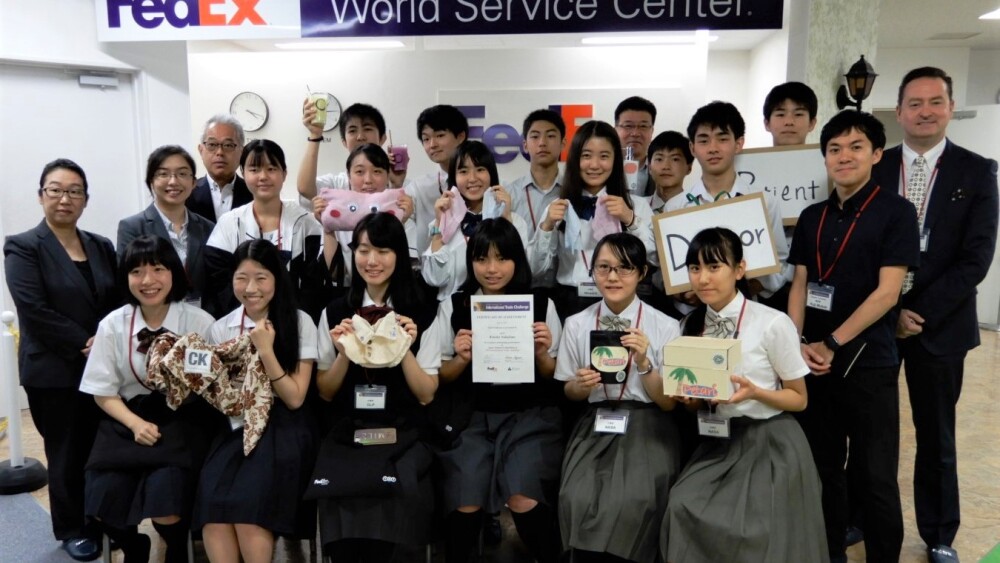TOKYO, July 17, 2019 - FedEx Express (FedEx), a subsidiary of FedEx Corp. (NYSE: FDX), and Junior Achievement Japan, a non-profit organization, hosted the qualifying round for the Japan teams at the 2019 FedEx Express/Junior Achievement International Trade Challenge (FedEx/JA ITC) on Monday, July 15, a national holiday.
Sixty-four teams (two students per team) submitted applications, and eight teams were invited to present their ideas in front of a panel of judges for this year’s local competition challenge, “Beauty Care Products and Services for Indonesia.” The three winning teams selected to represent Japan at the FedEx/JA ITC regional finals from August 18 – 21 in Malaysia are:
1. Team Rin Kuroda and Kento Numata from Hiroo Gakuen Senior High School:
This team’s business idea is to manufacture and sell “Zen Tropis,” a smoothie that aims to create beauty from within using ingredients including avocado and Japanese green tea blended with tropical fruits such as salak, mangosteen and rose apple organically grown in Indonesia. Zen Tropis also uses packaging made from biodegradable plastic to address environment concerns. This product will mainly target female tourists visiting Indonesia.
2. Team Hinata Nio and Ami Takamatsu from Hiroo Gakuen Senior High School:
This team’s business idea is to manufacture and sell a two-layer skin care sheet. The first layer is to remove the user’s makeup and the other is to provide moisturizing benefits. In Indonesia, there are many Muslims and prayer times are held several times throughout the day. As these women have to remove their makeup many times in the day, the team came up with this product for women who need to remove their makeup quickly. They created a first-year business plan to focus on Jakarta as a target market, aiming to expand it to other areas throughout the country.
3. Team Sakura Nakano and Yuki Sato from The High School of University of Hyogo:
This team’s business idea is to manufacture and sell a makeup sheet called “Petari,” which is made with ingredients that are Halal friendly. This is a makeup sheet that you leave on for 30 seconds on the face. There is a strong demand from Muslim women, including those in Indonesia, for Halal cosmetics and this product also appeals to women who want to shorten the time it takes to put on their makeup, as well as those who have to apply makeup many times throughout the day after prayer services.
Marking its 13th year, the program encourages entrepreneurialism in young people by providing a stimulating opportunity to develop innovative business ideas, broaden their knowledge on global trade and interact with students from the Asia Pacific region, thus enhancing possibilities for their future.
“FedEx is very proud to support the International Trade Challenge competition again this year.” said Ken McMahon, managing director, Sales, FedEx Express, board member of Junior Achievement Japan, and judge at the ITC local competition. “The ITC is a wonderful learning laboratory for our next generation of business leaders to develop skills in communication and collaboration that will help them connect Japan to the world.”
FedEx employees supported the finalists by serving as mentors and advising effective ways to develop business plans and prepare presentations.
“This was our first-time to experience making a business plan and coming up with strategies.” Some of the participating students commented, “It was a really positive experience to learn how to develop sales goals, estimate costs, and make long-term plans, as well as develop our presentation skills. We appreciate the advice from our mentors for the Japan finals and will apply what we learned from them at the regional competition in Malaysia.”
The three teams will join students from ten Asia Pacific markets: Japan, South Korea, mainland China, Hong Kong, the Philippines, Singapore, Thailand, Vietnam, Australia, and Malaysia. To further promote cross-border collaboration, finalists will not be competing with their peers in the same markets, but will instead go through a random selection to form new teams consisting of participants from different markets.
